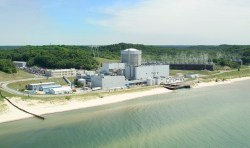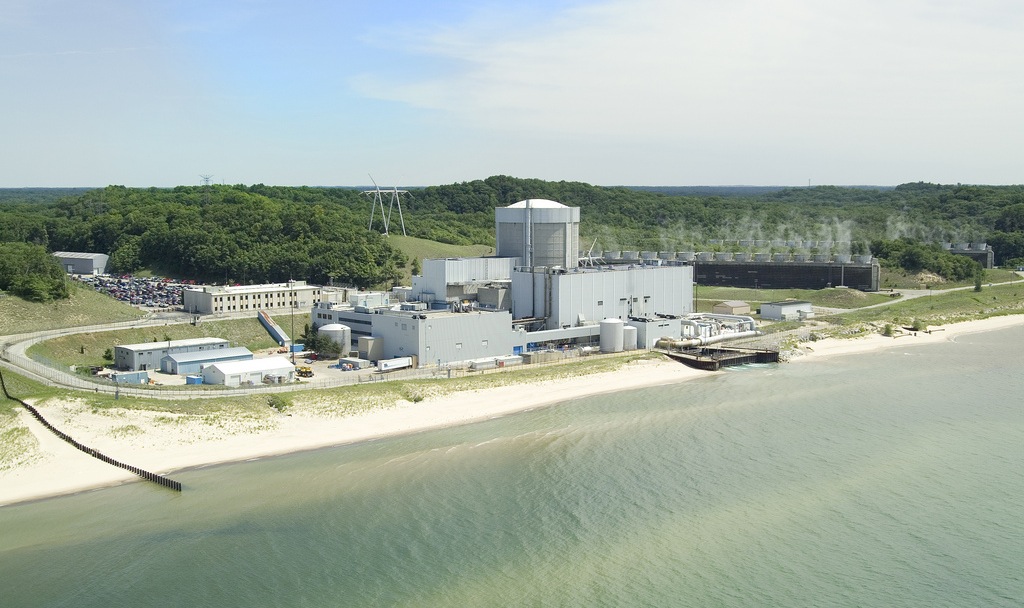
NRCPalisades Nuclear Generating Station
Last summer, a leaky tank led to the shutdown of the Palisades nuclear power plant in Michigan. So plant owner Entergy patched up the leak, fired back up the reactor, and hoped for the best.
Unfortunately, the best did not materialize.
The tank began leaking again. But no worries, thought the Einsteins at Entergy, it was only leaking a gallon a day. That was OK, they figured, because the NRC had allowed it to leak up to 38 gallons a day. As of Friday, they were still doing that whole “hoping for the best” thing.
But on Saturday the leaky drip turned into a gush, and all the hoping in the world couldn’t hold back the tide of spilling radioactive water. Nearly 80 gallons of water containing small amounts of radioactive tritium and possibly trace amounts of cobalt and cesium spewed into Lake Michigan, the Nuclear Regulatory Commission told the AP.
Early Sunday morning, the tank was ruled inoperable and the nuclear power plant began powering down. This is reportedly the ninth time that the facility has been shut down since 2011.
The Kalamazoo Gazette reports:
Leaks have been an ongoing issue at Palisades, owned by New Orleans-based Entergy Corp., which shut down four times in 2012 and twice so far this year. Most recently, in February, the plant shut down for six days to repair a component cooling water heat exchanger and replace a damaged switch.
The NRC resident inspectors monitored the shutdown and are closely watching repairs, [said the NRC’s Viktoria Mitlyng], and the NRC is sending an additional inspector. There is no current timeline for when Palisades might resume service, she said.
Palisades has been under extra scrutiny after a series of safety issues in 2011. In September, the NRC conducted an 11-day inspection of the plant and determined that those problems had been “adequately addressed” by operators, but that additional monitoring was warranted. The Nuclear Regulatory Commission has scheduled an extra 1,000 hours of inspection at Palisades during 2013.
Rep. Fred Upton (R-Mich.), chair of the House Committee on Energy and Commerce, is usually a good friend of energy companies (the dirty kind, at least), but in this case, with a leaky nuke plant in his district, he’s all about safety. Upton is demanding that Entergy consider replacing the entire leaky tank to prevent a repeat of the weekend’s accident before the power plant is fired back up.
From a followup article in the Kalamazoo Gazette:
Upton said that he plans to visit Palisades with one of the five members of Nuclear Regulatory Commission in the “very near future.”
“When it comes to nuclear energy, safety must always come first, and without that assurance by the NRC, the facility needs to stay offline,” said Upton. …
“It is my understanding that the water tank will be emptied by the end of the week with the hope that the cause of the leak can be identified shortly thereafter,” said Upton. “Every option must be on the table — including a full replacement of the tank — to ensure that the continuing leak will not occur again.”
Meanwhile, the AP assures us that the radioactive leak won’t hurt anybody. But it wonders whether Entergy might:
The amount of radiation the NRC says was released is near the background level — what is found occurring in the environment on a daily basis — and shouldn’t raise any public concern, said Ronald Gilgenbach, chairman of the nuclear engineering and radiological sciences department at the University of Michigan.
The public can generally count on the NRC’s risk assessments and its willingness to get tough with operators of nuclear plants that have recurring problems, said Alan Jackson, a radiation health physicist at Henry Ford Health System in Detroit.
What should be of concern to regulators and the public, Jackson said, is whether any nuclear power plant has enough of a culture of safety in place. That’s especially important because of the intense pressures in the electrical power industry to keep costs low.




